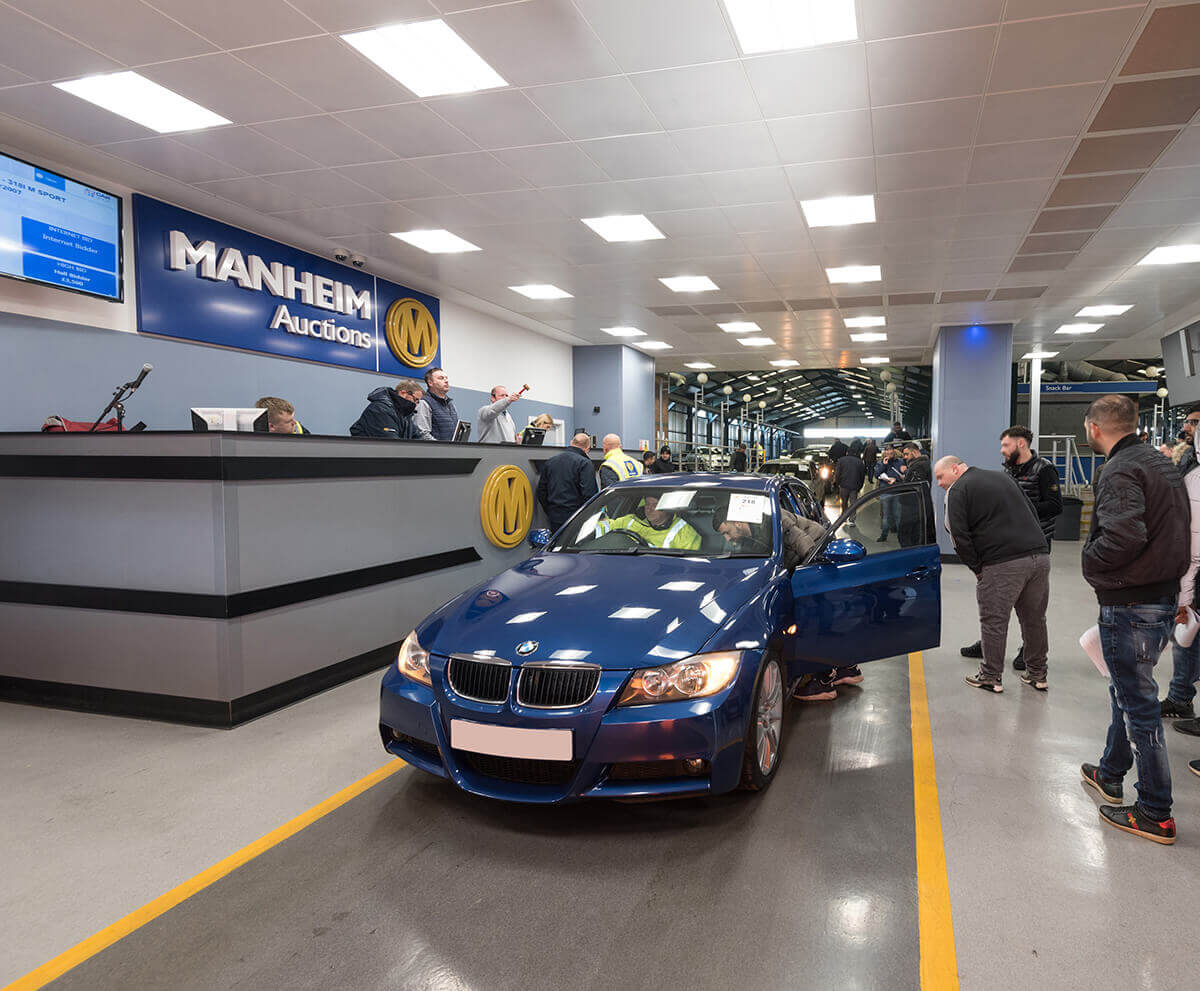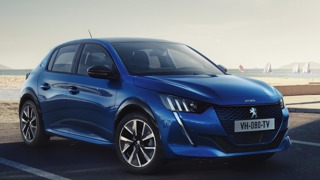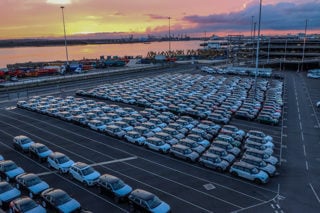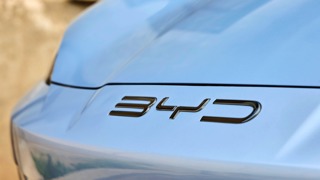Manufacturers are prioritising private consumers over fleet customers as they struggle to fulfil orders for new cars due to ongoing shortages of essential components.
New data, from the Society of Motor Manufacturers and Traders (SMMT), shows that private registrations have increased by 4.7% in the first half of 2022, compared with last year. However, core fleet registrations – classified as ‘leasing/contract hire and fleet other’ by the SMMT – fell by 13.6%.
New car sales to other fleet sectors were also down, with registrations to Motability falling by more than a fifth (21.2%), and by more than three quarters (76.5%) to the rental sector.
Overall, just in excess of 802,000 new cars have been registered from January to June – a 12% decline on the 909,000 registered in the same period last year.
Core fleet market share, however, remained static, accounting for a third (34%) of all new cars sold, while private registrations grew market share by more than eight percentage points, from 43.5% to 51.7% year-on-year, to now account for more than half of the market.
When taking into account all fleet channels, total fleet and business registrations accounted for 55.9% of the market in 2019, when almost 1.3 million cars were registered to fleets. However, the sector’s market share has been steadily declining since.
“Cars are like gold dust at the moment,” Nick Hardy, Ogilvie Fleet
In 2020, with manufacturers severely impacted by Covid-19 and 400,000 fewer company cars finding their way to fleets, market share fell to 54.1%, before falling again last year to 53.2%, with a 4.5% year-on-year decline in fleet registrations, as the global semiconductor shortage slowed production.
However, SMMT data suggests that, so far this year, the decline has been even greater, with a 9.4 percentage point swing away from fleet to retail, resulting in fleet and business registrations now only accounting for 46.5% of the market.
Vehicle Remarketing Association (VRA) chair, Philip Nothard, said: “To some extent, it makes sense for manufacturers to do this. New car supply is poor, and factors such as the ongoing semiconductor shortage and the war in Ukraine are unlikely to significantly improve any time soon.
“Carmakers are simply maximising their profit potential.”
FOCUS ON PRIVATE SALES
Looking at individual carmakers, Volkswagen Group brands Audi, Škoda and Volkswagen showed some of the biggest declines in core fleet sales compared with the performance of private registrations.
Core fleet sales for Audi declined by almost a third (29.2%) in the first half of 2022, compared with the same period last year, while private registrations increased by 5.7%, according to the SMMT.
At Škoda, the disparity was even greater, with core fleet registrations more than halved – declining by 58.6% – while private registrations grew by 9.7%.
There was a similar decline in core fleet registrations at Volkswagen. SMMT figures show they fell 59.1%, year-on-year, while private registrations also declined, but by a much smaller margin, recording a 9.6% dip.
However, a Volkswagen Group spokesperson insisted that, when comparing sales with 2019 – a year unaffected by lockdowns – and comparing retail customer to corporate sales, there is “no significant difference” between the performance of the retail and corporate sales channels.
He added: “While the semiconductor situation is gradually improving, we expect it to remain volatile through the second half of 2022, with a significant improvement not expected until sometime in 2023.”
Kia reported a 55.8% increase in core fleet registrations alongside a 20.5% increase in private sales, bucking the trend, but acknowledged the prioritisation of the retail market over fleet.
Speaking to Fleet News at Company Car in Action (CCIA), John Hargreaves, fleet and remarketing director at Kia Motors UK, said the manufacturer would be attempting to control some of the fleet channels a “little bit more, because we do not want to get in a position where we have orders with no realistic chance of supplying them in a sensible time frame”.
He explained: “We are going to try to take some of the heat out, but at the same time we will keep a presence in all those markets.
“We will not be avoiding rental, we’ll just be doing a little less over the rest of year. We won’t be pulling out of Motability, we will probably have fewer models on offer.”
He added: “The ethos for us is to be consistently present, but possibly scaled back a little bit for the rest of the year.”
In terms of new product, such as new Niro, Hargreaves said after being available to private customers, it would be made available to the fleet market in the next “month or two”.
“We want to give retail customers a chance to have that car and then we will introduce it into the fleet,” he said.
Vauxhall’s core fleet registrations fell by just 7.9% in the first half of 2020, but private sales were up 27%.
It was a similar story at fellow Stellantis brand Peugeot, where its core fleet sales were down by more than a fifth (21.5%), while private registrations were up by 12.2%.
Ford, meanwhile, saw core fleet registrations fall by 17%, compared with a 12.5% decline in private sales.
IMPACT ON FLEET OPERATIONS
Paul Hollick, chair of the Association of Fleet Professionals (AFP), said: “We are hearing many stories that suggest the situation is worsening, at least for certain businesses, and show no apparent signs of improving.
“Some fleet managers are telling us that drivers are having to go through the process of choosing a new car half a dozen times before finding one for which a manufacturer will even provide a production slot – and that date is likely to be a year or more away. Other manufacturers have closed their order books either completely or for certain models.”
Hollick says plug-in hybrid electric vehicles (PHEVs) have become very difficult to acquire, with production being skewed away from them towards EVs, because of the Clean Air For Europe (CAFE) regulations, which set average emissions targets for manufacturers.
“Even when cars can be obtained, they are often being delivered without meeting the order specification,” he continued.
“The wrong colour is fairly commonplace, but equipment is often missing – parking sensors seem to be a particular issue – with no resulting adjustment in price.
“All of these problems exist for petrol and diesel cars but can generally be doubled for EVs.”
RENTAL SUFFERING MOST
Leasing company Ogilvie Fleet says each fleet sector is suffering to differing degrees, with rental hardest hit.
Sales and marketing director Nick Hardy said: “It’s a challenge that we have to face every single day, but cars are like gold dust at the moment and if it’s more profitable to push product into retail, can you blame the manufacturers for doing it?”
He also highlighted how private new car purchases normally came with a part-exchange deal, allowing dealers to replenish used stock which is in short supply. He explained: “The vast majority of people will part-exchange, so the dealer gets two profit centres not one.”
SHORTAGE OF USED CARS

The shortage of new company cars finding their way on to fleets has meant they have been left with little choice but to continue operating their existing cars for as long as possible.
“The situation creates two sets of problems,” Hollick explained. “The first is that the car is ageing and difficulties with keeping it on the road in a cost-effective manner increase over time.”
Some cars are now being operated into their fifth year and will probably still be on the fleet in their sixth, because they cannot be replaced.
“These are uncharted waters in maintenance terms,” he continued. “The second is an employee satisfaction issue.
“Drivers who are keen to move into EVs but simply cannot get hold of the right model are having to continue to pay benefit-in-kind on ageing and increasingly unattractive diesel models, with no solution in sight.”
Historically, fleets have also provided a steady supply of cars into the used sector, but this has fallen massively in recent years as new car production has declined since the start of the pandemic.
KEEPING VEHICLES LONGER
That creates a problem for the used car market because private buyers tend to hang on to their vehicles for a year or two longer.
“The cars that they push into the used market when they get a new model tend to be older, and then they will keep hold of that for longer in turn,” said Nothard, who is also insight and strategy director at Cox Automotive.
“The vehicle life model that we have seen for decades, and which has served the used car market with a predictable flow of stock no longer fully exists, and this will undoubtedly constrict future supply.”
There is even the possibility, he says, that fleets could become “habitualised” to operating cars for more extended periods, which would also have an impact on the used market.
NEW CAR MARKET OUTLOOK
Given the ongoing impact of supply chain constraints and broader macro-economic factors, the SMMT revised its market outlook for 2022 in April, with 1.72 million new cars now expected to be registered during the year, down from the 1.89 million predicted in January.
While this still represents a 4.5% rise on 2021, it highlights the effect the semiconductor shortage is still having on supply as well as anticipated impacts from rising living costs.
“I think this is the new norm,” said Hardy. “I think the years of 2.5 million new car registrations have gone and they’re not coming back.
“They’re not coming back because manufacturers have seen the light. They’re asking themselves ‘why would we build more cars, when we can build profitably, charge more and sell less, and we’re better off for it’.”
Hardy does believe, however, that manufacturers will increase production so factory order times for vehicles improve from the wait of more than a year currently being seen for some models.
“From a fleet perspective, the lead time for a factory-built car used to be eight-12 weeks, now it’s 12-15 months,” he said.
“I think they’ll get production to the point where, if you want a new car specced to how you want it, you’ll be waiting six-nine months.”
For more on the new car market, Philip Nothard, chair of the Vehicle Remarketing Association (VRA) and insight and strategy director at Cox Automotive examines what factors are impacting the sector.






















Login to comment
Comments
No comments have been made yet.